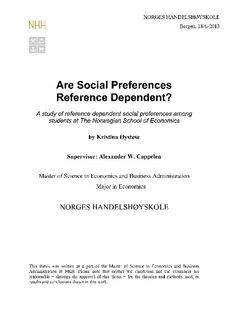Are social preferences reference dependent? a study of reference dependent social preferences among students at the Norwegian School of Economics
Master thesis
Permanent lenke
http://hdl.handle.net/11250/281549Utgivelsesdato
2013Metadata
Vis full innførselSamlinger
- Master Thesis [4372]
Sammendrag
This thesis explores whether social preferences are reference dependent. More specifically it
examines whether reference points, defined by expectations, regarding income inequality
affect our willingness to redistribute income (pro-social behavior). The theoretical
background for this thesis is two important insights from behavioral economics. The first
insight comes from the theory of loss aversion – that people evaluate outcomes relative to a
reference point shaped by their expectations. The second insight comes from the theory of
social preferences – that people not only care about their own welfare (income), but also
about other people’s welfare, and hence fairness and equality. Combined, these two insights
suggest that people’s expectations regarding income inequality, as well as deviations from
these expectations, influence how they evaluate their own utility – in addition to own income
and deviations from own expected income.
This thesis reports the results from an economic experiment designed to study the role of
expectations in explaining redistributive behavior. The analysis is based on data from three
separate lab-experiments conducted on the student body at The Norwegian School of
Economics in the spring and early fall of 2012. Designed as a dictator game, the students
were tested on how their willingness to redistribute income was affected by the
implementation of different reference points through the use of treatments altering their
expectations.
The main finding of this thesis is that when people expect inequality they give away almost
30 percent less than when they expect equality, ceteris paribus. This is a huge effect, and
demonstrates the importance of reference dependence in explaining pro-social behavior. The
result may also be important in explaining why e.g. Americans redistribute a smaller share of
their income than do taxpayers in Scandinavian countries, and to an extent why many
welfare states differ to the degree which they do.
